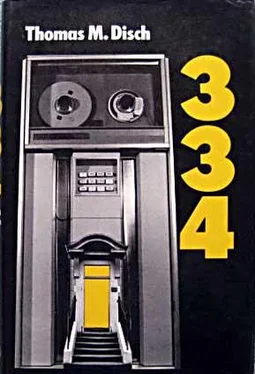So young—Chapel lifted his limp left wrist and checked the age on the Identi-Band—and handicapped for life. Ah, there was a lesson in it.
“The poor man,” said the substitute, meaning not the boy but the transfer. She handed Chapel the transfer form.
“Oh?” said Chapel, unlocking the wheels.
She went round to the head of the cart. “A subtotal,” she explained. “And… ” The cart bumped gently into the door frame. The bottle swayed at the top of the intravenous pole. The old man tried to lift his hands but they were strapped to the sides. His fingers clenched.
“And?”
“It’s gone to the liver,” she explained in a strange whisper.
Chapel nodded somberly. He’d known it must have been something as drastic as that since he was routed up to heaven, the 18th floor. Sometimes it seemed to Chapel that he would have saved Bellevue a lot of needless trouble if he’d just take all of these to Ab Holt’s office straightaway instead of bothering with the 18th floor.
In the elevator Chapel paged through the man’s file. WANDTKE, JWRZY. The routing slip, the transfer form, the papers in the folder, and the Identi-Band all agreed: JWRZY. He tried sounding it out, letter by letter.
The doors opened. Wandtke’s eyes opened.
“How are you?” Chapel asked. “Do you feel okay? Hm?”
Wandtke began laughing, very softly. His ribs fluttered beneath the green electric sheet.
“We’re going to your new ward now,” Chapel explained. “It’s going to be a lot nicer there. You’ll see. Everything is going to be all right, uh …” He remembered that it was not possible to pronounce his name. Could it be, despite all the forms, a mistake?
Anyhow there wasn’t much point trying to communicate with this one. Coming up from surgery they were always loaded so full of whatever it was that there was no sense to anything they said. They just giggled and rolled their eyes around, like this Wandtke. And in two weeks, cinders in a furnace. Wandtke wasn’t singing at least. Lots of them sang.
Chapel’s shoulder started in, a twinge. The twinge became an ache and the ache thickened and enveloped him in a cloud of pain. Then the cloud scattered into wisps, the wisps vanished. All in the distance of a hundred yards in ‘K’ wing, and without his slowing, without a wink.
It wasn’t bursitis, that much seemed certain. It came and went, not in flashes, but like music, a swelling up and then a welling away. The doctors didn’t understand it, so they said. Eventually it went away, and so (Chapel told himself) he had nothing to complain about. That things could have been a lot worse was demonstrated to him all the time. The kid tonight, for instance, with the false face that would always ache in cold weather, or this Wandtke, giggling like he’d come from some damned birthday party, and with his liver changing itself all the while into some huge, horrible growth. Those were the people to feel sorry for, and Chapel felt sorry for them with some gusto. By comparison to such wretched, doomed creatures, he, Chapel, was pretty lucky.
He handled dozens every shift, men and women, old and young, carting them here and there, up and down, and there wasn’t one of them, once the doctors had done their job, who wouldn’t have been happy to change places with the short, thin, brittle, old black man who wheeled them through these miles of scabby corridors, not one.
Miss Mackey was on duty in the men’s ward. She signed for Wandtke. Chapel asked her how he was supposed to pronounce a name like that, Jwrzy, and Miss Mackey said she certainly didn’t know. It was probably a Polish name anyhow. Wandtke—didn’t it look Polish?
Together they steered Wandtke to his unit. Chapel connected the cart, and the unit, purring softly, scooped up the old body, lifted, and stuck. The unit shut itself off. It was a moment before either Chapel or Miss Mackey realized what was wrong. Then they unstrapped the withered wrists from the aluminum bars of the cart. The unit, this time, experienced no difficulty.
“Well,” said Miss Mackey, “I know two people who need a day’s rest.”
5:45. This close to clocking out, Chapel didn’t want to return to the duty room and risk a last-minute assignment. “Any dinners left?” he asked the nurse.
“Too late here, they’ve all been taken. Try the women’s ward.”
In the women’s ward, Havelock, the elderly aide, dug up a tray that had been meant for a patient who had terminated earlier that evening. Chapel got it for a quarter, after pointing out the low-residue sticker Havelock had tried to conceal under his thumb.
NEWMAN, B, the sticker read.
Ab would have her now. Chapel tried to remember what unit she’d been in. The blonde girl in the corner who couldn’t stand sunlight? Or the colostomy who was always telling jokes? No, her name was Harrison.
Chapel pulled one of the visitors’ chairs over to the window ledge. He opened the tray and waited for the food to warm. He ate from one compartment at a time, chewing at his single stolid speed, though the whole dinner was the consistency of a bowl of Breakfast. First the potatoes; then, some steamy, soft meat cubes; then, dutifully, a mulch of spinach. He left the cake but drank the Koffee, which contained the miracle ingredient that (aside from the fact that no one ever returned) gave heaven its name. When he was done he shot the tray downstairs himself.
Havelock was inside, on the phone.
The ward was a maze of blue curtains, layers of translucence overlapping layers of shadows. A triangle of sunlight spread across the red tile floor at the far end of the room: dawn.
Unit 7 was open. At one time or another Chapel must have carted its occupant to and from every division of the hospital: SCHAAP, FRANCES, 3/3/04. Which made her eighteen, barely. Her face and neck were speckled with innumerable scarlet spider nevi, but Chapel remembered when it had been a pretty face. Lupus.
A small gray machine beside the bed performed, approximately, the functions of her inflamed liver. At irregular intervals a red light would blink on and, quickly, off, infinitesimal warnings which no one heeded.
Chapel smiled. The little miracles were starting to unfold themselves in his blood stream, but that was almost beside the point. The point was simple: They were dying: he was alive. He had survived and they were bodies. The spring sunlight added its own additional touch of good cheer to the here of heaven and the now of six a.m.
In an hour he would be home. He’d rest a while, and then he’d watch his box. He thought he could look forward to that.
Heading home down First, Ab whistled a piece of trash that had stuck in his head four days running, about some new pill called Yes, that made you feel better, and he did.
The fifty dollars he’d got for the Newman body brought his take for the week up to a handsome $115. Once he’d seen what Ab was offering, White hadn’t even haggled. Without being necrophile himself (to Ab a body was just a job to be done, something he carted down from the wards and burned or—if there was money to burn instead—shipped off to a freezing concern) Ab understood the market well enough to have recognized in Bobbi Newman a certain ideal quality of deathliness. Lupus had taken a fulminant course with her, rapidly destroying one internal system after another without, for a wonder, marring the fine texture of the skin. True, the disease had whittled face and limbs down to bone thinness, but then what else was necrophilia about? To Ab, who liked them big, soft, and lively, all of this fuss over corpses was pretty alien, yet basically his motto was “Chacun à son goût,” though not in so many words. There were limits, of course. For example, he would willingly have assisted at the castration of any Republican in the city, and he felt nearly as passionate a distaste for political extremists. But he possessed the basic urban tolerance for any human peculiarity from which he stood a good chance of making money.
Читать дальше












